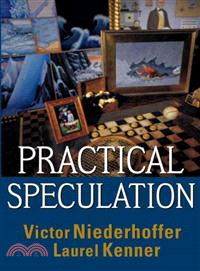相關商品
商品簡介
作者簡介
名人/編輯推薦
目次
商品簡介
The follow-up to Victor Niederhoffer's critically and commercially acclaimed book The Education of a Speculator has finally arrived. Practical Speculation continues the story of a true market legend who ran a hugely successful futures trading firm that had annual returns of over thirty percent until unforeseen losses forced him to close operations. Like a phoenix rising from the ashes, Niederhoffer returned to the world of trading stocks, futures, and options, with a new colleague and a new approach and found success. Order your copy of this compelling story of risk and survival today.
作者簡介
VICTOR NIEDERHOFFER’s storied career as a speculator spans more than twenty-five years. He began speculating in commodities in the 1970s, and through 1997 held one of the most successful track records of any hedge fund manager. He currently manages money for overseas clients and trades for his own account. Niederhoffer is the author of the critically acclaimed and bestselling Education of a Speculator, and has written numerous articles for scholarly and professional publications including the Financial Analysts Journal. A magna cum laude graduate of Harvard (1964) and the University of Chicago (PhD 1969), Victor taught finance at Berkley and founded Niederhoffer, Cross & Zeckhauser, a mergers and acquisitions firm that was a leader in the field for many years. During the 1970s he dominated the squash world, claiming the world title in 1976. He currently writes a weekly column for CNBC Money with Laurel Kenner.
LAUREL KENNER is a financial writer. Her columns on the stock market, co-written with Victor Niederhoffer, have appeared on CNBC Money, worldlyinvestor.com, and TheStreet.com. Her journalism career includes five years as chief U.S. stocks editor at Bloomberg News and five years as an award-winning aerospace reporter for Copley Newspapers. She holds a degree in classical piano from the University of California at Los Angeles.
LAUREL KENNER is a financial writer. Her columns on the stock market, co-written with Victor Niederhoffer, have appeared on CNBC Money, worldlyinvestor.com, and TheStreet.com. Her journalism career includes five years as chief U.S. stocks editor at Bloomberg News and five years as an award-winning aerospace reporter for Copley Newspapers. She holds a degree in classical piano from the University of California at Los Angeles.
名人/編輯推薦
". . . the best trading book of the young millenium. . . offers more trading 'truth' than a dozen typical market books combined. It's in a league of it's own." (Active Trader magazine)
At last, some modest proof of what some of us have long suspected - beware of lords on boards. Authors Victor Niederhoffer and Laurel Kenner* studied the relationship between stock returns and the number of board members with titles in the 50 largest companies by market value in the FTSE 100. Over a five year period, the more titles on the board, the worse the performance of the shares.
Niederhoffer and Kenner even invented a valuation indicator, the earnings/lords ratio, dividing the earnings per share by the number of titles in the boardroom. At the time they did the study, Powergen, with just one lord, looked the most attractive stock on this basis.
The finding raises the obvious question of causality. As the authors write: "Was it the lords who caused the lackluster performance or the lackluster performance that prompted the companies to use lords as window-dressing?"
That comment, however, suggests a possible American misunderstanding of the British honors system. The presence of titles on UK boards does not simply indicate the lingering influence of the ancient British aristocracy. Charities may still want to recruit Lord Ponsonby-Snodgrass just to make the notepaper look respectable; boards of FTSE 100 companies don't really need to do so.
Instead, the preponderance of titles shows the tendency for the honours system to reward people for business success. Rise to the top of a FTSE 100 company and you can be pretty sure a gong is heading your way, especially if you have the foresight to make some political donations.
The "lords on boards" effect may thus be merely another indication of the old rule of "reversion to the mean". Executives get awarded titles when profits are strong and the share price is rising, not in the aftermath of profit warnings and failed acquisitions. Since all companies eventually suffer some sort of bad news, the disasters are more likely to occur after the honours are awarded. When the queen brings the sword down on an executive's shoulder, the blade of Damocles may not be far behind it. *Practical Speculation, published by John Wiley & Sons (The Financial Times, June 4, 2003)
"...At last, some modest proof of what some of us have long suspected - beware of lords on boards..." (Financial Times, 3 June 2003)
"...will enable the investor to make independent decisions about their investments with confidence..." (Portfolio International, June 2003)
"...shows how far pension fund figures are out of line with long -term share market expectation..." (Liverpool Daily Post, 6 August 2003)
"Niederhoffer and Kenner dispense pearls of wisdom for both the seasoned professional and the novice about investing and much more. Though you may not agree with all that they write – I can’t imagine anyone would – they will compel you to think and very often, cause you to smile." --Mark P. Kritzman
I consider Victor Neiderhoffer's highly entertaining Practical Speculation to be a modern classic. In Practical Speculation, Neiderhoffer explores a wide range of fascinating topics ranging from the wisdom of value investing to the implications of a company slapping its name on a shiny new stadium. - Street.com
"Niederhoffer and Kenner dispense pearls of wisdom for both the seasoned professional and the novice about investing and much more. Though you may not agree with all that they write – I can’t imagine anyone would – they will compel you to think and very often, cause you to smile." --Mark P. Kritzman
At last, some modest proof of what some of us have long suspected - beware of lords on boards. Authors Victor Niederhoffer and Laurel Kenner* studied the relationship between stock returns and the number of board members with titles in the 50 largest companies by market value in the FTSE 100. Over a five year period, the more titles on the board, the worse the performance of the shares.
Niederhoffer and Kenner even invented a valuation indicator, the earnings/lords ratio, dividing the earnings per share by the number of titles in the boardroom. At the time they did the study, Powergen, with just one lord, looked the most attractive stock on this basis.
The finding raises the obvious question of causality. As the authors write: "Was it the lords who caused the lackluster performance or the lackluster performance that prompted the companies to use lords as window-dressing?"
That comment, however, suggests a possible American misunderstanding of the British honors system. The presence of titles on UK boards does not simply indicate the lingering influence of the ancient British aristocracy. Charities may still want to recruit Lord Ponsonby-Snodgrass just to make the notepaper look respectable; boards of FTSE 100 companies don't really need to do so.
Instead, the preponderance of titles shows the tendency for the honours system to reward people for business success. Rise to the top of a FTSE 100 company and you can be pretty sure a gong is heading your way, especially if you have the foresight to make some political donations.
The "lords on boards" effect may thus be merely another indication of the old rule of "reversion to the mean". Executives get awarded titles when profits are strong and the share price is rising, not in the aftermath of profit warnings and failed acquisitions. Since all companies eventually suffer some sort of bad news, the disasters are more likely to occur after the honours are awarded. When the queen brings the sword down on an executive's shoulder, the blade of Damocles may not be far behind it. *Practical Speculation, published by John Wiley & Sons (The Financial Times, June 4, 2003)
"...At last, some modest proof of what some of us have long suspected - beware of lords on boards..." (Financial Times, 3 June 2003)
"...will enable the investor to make independent decisions about their investments with confidence..." (Portfolio International, June 2003)
"...shows how far pension fund figures are out of line with long -term share market expectation..." (Liverpool Daily Post, 6 August 2003)
"Niederhoffer and Kenner dispense pearls of wisdom for both the seasoned professional and the novice about investing and much more. Though you may not agree with all that they write – I can’t imagine anyone would – they will compel you to think and very often, cause you to smile." --Mark P. Kritzman
I consider Victor Neiderhoffer's highly entertaining Practical Speculation to be a modern classic. In Practical Speculation, Neiderhoffer explores a wide range of fascinating topics ranging from the wisdom of value investing to the implications of a company slapping its name on a shiny new stadium. - Street.com
"Niederhoffer and Kenner dispense pearls of wisdom for both the seasoned professional and the novice about investing and much more. Though you may not agree with all that they write – I can’t imagine anyone would – they will compel you to think and very often, cause you to smile." --Mark P. Kritzman
目次
Introduction.
PART ONE: MUMBO JUMBO AND MOONSHINE.
1. The Meme.
2. Earnings Propaganda.
3. The Hydra Heads of Technical Analysis.
4. The Cult of the Bear.
5. "We Are Number One" Usually Means "Not Much Longer".
6. Benjamin Graham: Mythical Market Hero.
7. News Flash: Computer Writes Stock Market Story!
PART TWO: PRACTICAL SPECULATION.
8. How to Avoid Spurious Correlations.
9. The Future of Returns.
10. The Periodic Table of Investing.
11. When They Swing for the Fences, We Run for the Exits.
12. Boom or Bust?
13. Market Thermodynamics.
14. Practical Market Lessons from the Tennis Court.
15. The Fine Art of Bargaining for an Edge.
16. An Amiable Idiot in the Biotechnology Revolution.
17. Earnings Impostors.
18. Finale.
Afterword.
Notes.
Index.
PART ONE: MUMBO JUMBO AND MOONSHINE.
1. The Meme.
2. Earnings Propaganda.
3. The Hydra Heads of Technical Analysis.
4. The Cult of the Bear.
5. "We Are Number One" Usually Means "Not Much Longer".
6. Benjamin Graham: Mythical Market Hero.
7. News Flash: Computer Writes Stock Market Story!
PART TWO: PRACTICAL SPECULATION.
8. How to Avoid Spurious Correlations.
9. The Future of Returns.
10. The Periodic Table of Investing.
11. When They Swing for the Fences, We Run for the Exits.
12. Boom or Bust?
13. Market Thermodynamics.
14. Practical Market Lessons from the Tennis Court.
15. The Fine Art of Bargaining for an Edge.
16. An Amiable Idiot in the Biotechnology Revolution.
17. Earnings Impostors.
18. Finale.
Afterword.
Notes.
Index.
主題書展
更多主題書展
更多書展本週66折
您曾經瀏覽過的商品
購物須知
外文書商品之書封,為出版社提供之樣本。實際出貨商品,以出版社所提供之現有版本為主。部份書籍,因出版社供應狀況特殊,匯率將依實際狀況做調整。
無庫存之商品,在您完成訂單程序之後,將以空運的方式為你下單調貨。為了縮短等待的時間,建議您將外文書與其他商品分開下單,以獲得最快的取貨速度,平均調貨時間為1~2個月。
為了保護您的權益,「三民網路書店」提供會員七日商品鑑賞期(收到商品為起始日)。
若要辦理退貨,請在商品鑑賞期內寄回,且商品必須是全新狀態與完整包裝(商品、附件、發票、隨貨贈品等)否則恕不接受退貨。
























